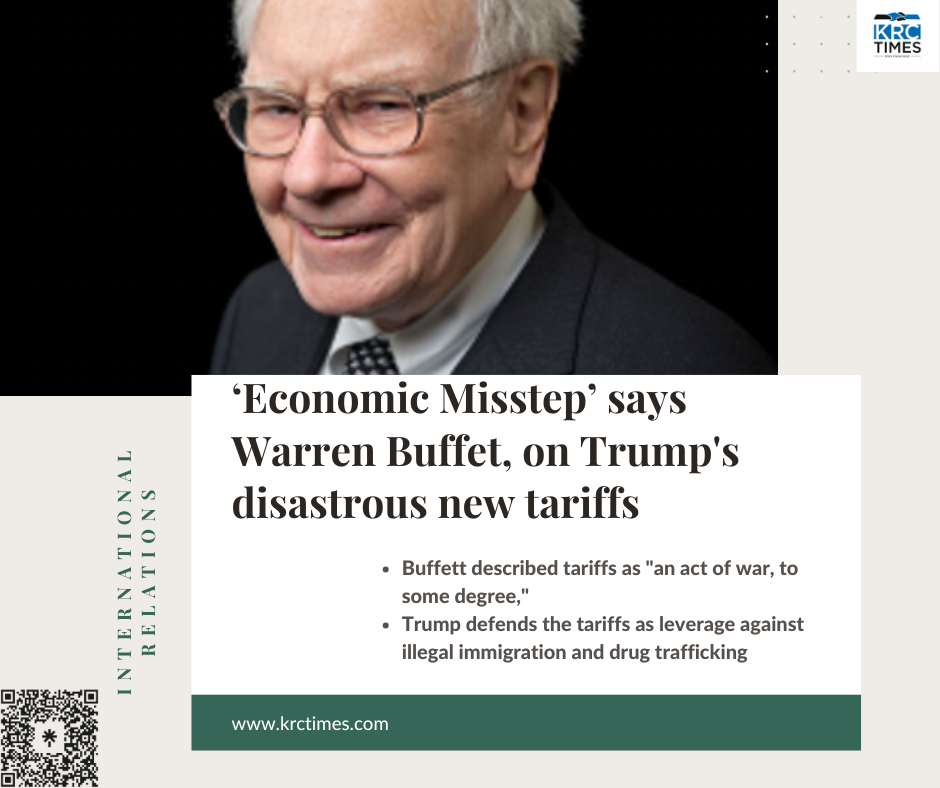His latest remarks underscore a long-held view that tariffs disrupt trade and disproportionately hit everyday Americans
 KRC TIMES Desk
KRC TIMES Desk

Warren Buffett has sharply criticized Donald Trump’s recently implemented tariffs, calling them an economic misstep with severe consequences. In a CBS interview aired on March 2, 2025, Buffett described tariffs as “an act of war, to some degree,” arguing that they function as a tax on goods that ultimately burdens American consumers. “Over time, they are a tax on goods. I mean, the Tooth Fairy doesn’t pay ‘em!” he said, emphasizing that the costs don’t magically disappear but are passed on through higher prices.
Trump’s new tariffs, effective as of March 4, 2025, include a 25% levy on imports from Canada and Mexico and an increase from 10% to 20% on Chinese goods. These measures target the U.S.’s three largest trading partners, which accounted for over 40% of U.S. imports in 2024. Buffett’s critique aligns with his past warnings—during Trump’s first term, he called steep tariffs “a very bad idea” that could “cut down on trade dramatically” and harm the global economy. His latest remarks underscore a long-held view that tariffs disrupt trade and disproportionately hit everyday Americans.
The timing is notable: Buffett spoke just before the tariffs took effect, as part of a documentary interview about Katharine Graham, not a direct economic forum. Yet his words carry weight given Berkshire Hathaway’s vast stakes in industries like manufacturing, railroads, and retail—sectors sensitive to trade policy shifts. He didn’t mince words about the ripple effects, asking, “And then what?”—a prompt for policymakers to consider the long-term fallout, like inflation and strained international relations.
Economists echo Buffett’s concerns: The Tax Foundation estimates these tariffs could reduce U.S. GDP by 0.2% to 0.3% and cost over 223,000 jobs, even before foreign retaliation. Canada and Mexico have already signaled retaliatory tariffs, with Canadian PM Justin Trudeau targeting C$30 billion in U.S. exports initially, and China has hit back with 10-15% tariffs on U.S. agricultural goods. Posts on X reflect public alarm, with some calling it a “self-inflicted Trump recession,” though these sentiments aren’t conclusive evidence.
Trump defends the tariffs as leverage against illegal immigration and drug trafficking, particularly fentanyl, claiming they’ll protect U.S. interests. Critics, including Buffett, see them as a blunt tool that ignites trade wars—China’s foreign ministry vowed to “fight to the bitter end”—and risks economic turbulence. While Buffett didn’t label the policy “disastrous” verbatim, his “act of war” framing and dire economic warnings torch the tariff plan as a reckless gamble. He declined to comment further on the economy’s state, saying it’s “the most interesting subject in the world, but I can’t talk about it,” leaving his tariff critique as a standalone flare.
Promotional | InfoCom Diary–Business Directory



